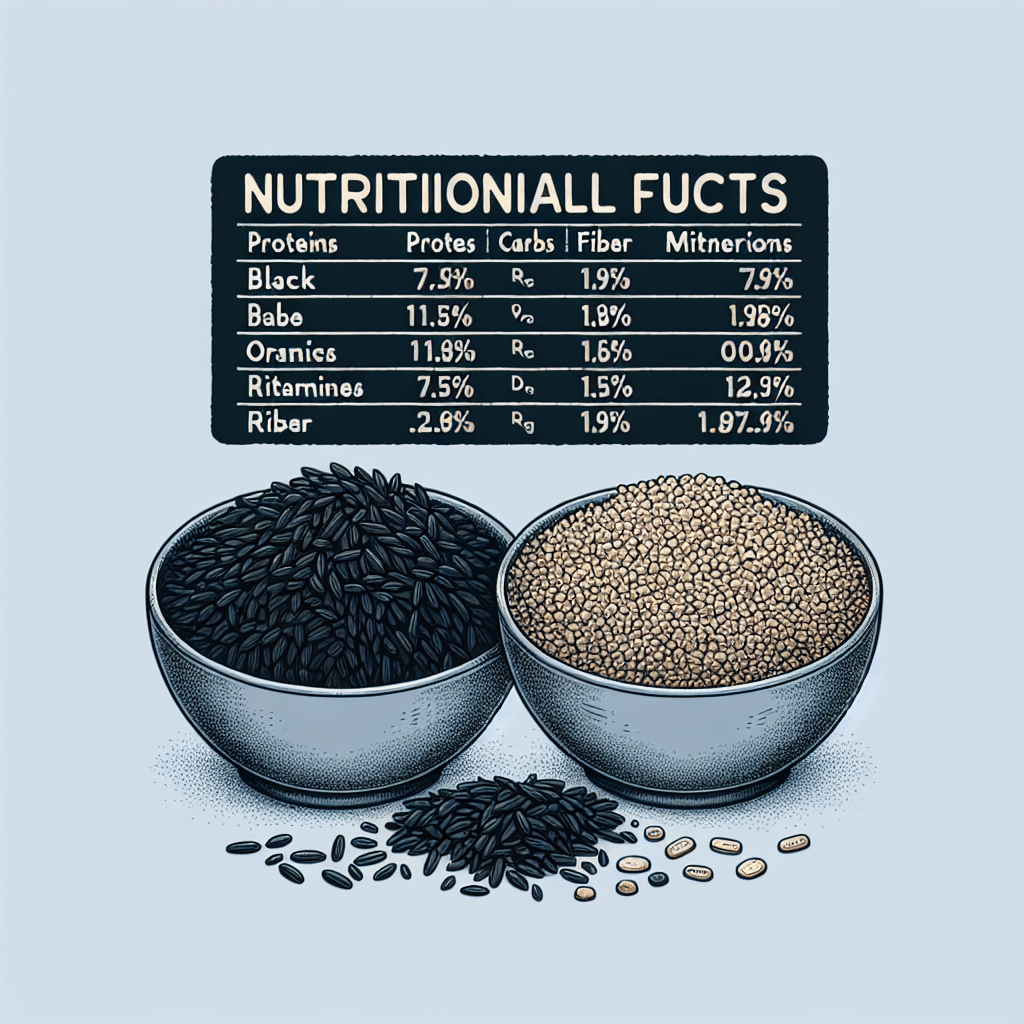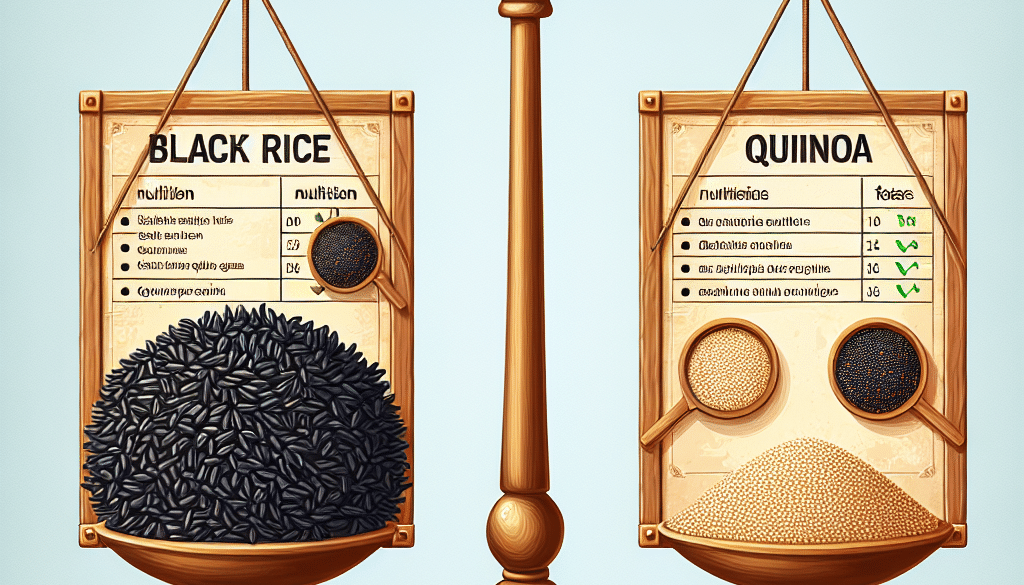Which is healthier black rice or quinoa?
-
Table of Contents
- Black Rice vs. Quinoa: Unveiling the Healthier Choice
- Nutritional Comparison of Black Rice and Quinoa
- Health Benefits of Black Rice
- Health Benefits of Quinoa
- Potential Drawbacks
- Which is Healthier: Black Rice or Quinoa?
- Conclusion: A Balanced Approach to Whole Grains
- Enhance Your Diet with ETprotein’s Quality Protein Products
Black Rice vs. Quinoa: Unveiling the Healthier Choice

When it comes to choosing healthy grains, black rice and quinoa have both risen in popularity as nutritious alternatives to traditional white rice and other refined grains. These ancient foods are praised for their health benefits and have become staples in the diets of health-conscious individuals. But which one is healthier? In this article, we will delve into the nutritional profiles, health benefits, and potential drawbacks of black rice and quinoa to determine which grain might be the superior choice for your diet.
Nutritional Comparison of Black Rice and Quinoa
Both black rice and quinoa are known for their impressive nutrient content, but they have distinct nutritional profiles that may influence your choice depending on your dietary needs.
- Protein: Quinoa is often celebrated for its high protein content, containing all nine essential amino acids, making it a complete protein. Black rice, while also a good source of protein, does not provide a complete amino acid profile.
- Fiber: Both grains are excellent sources of dietary fiber, which is essential for digestive health. However, black rice typically has a slightly higher fiber content than quinoa.
- Antioxidants: Black rice is rich in anthocyanins, the same type of antioxidants found in dark berries. These compounds are known for their anti-inflammatory and anti-cancer properties. Quinoa also contains antioxidants, but in lower amounts compared to black rice.
- Vitamins and Minerals: Quinoa is a good source of B-vitamins, magnesium, iron, phosphorus, and manganese. Black rice also contains these nutrients but stands out for its vitamin E content, which is important for skin health and immune function.
Both grains are naturally gluten-free, making them suitable for those with celiac disease or gluten sensitivity.
Health Benefits of Black Rice
Black rice, also known as forbidden rice, was once reserved for Chinese royalty due to its superior health benefits. Today, it is available to everyone and offers several health advantages:
- Rich in anthocyanins, black rice may help protect against chronic diseases such as heart disease, cancer, and diabetes.
- The high fiber content promotes a healthy digestive system and may aid in weight management by providing a feeling of fullness.
- Its anti-inflammatory properties can help reduce the risk of inflammation-related conditions.
Health Benefits of Quinoa
Quinoa, often referred to as a superfood, is a seed that is consumed like a grain. It has gained popularity for its health benefits, which include:
- Being a complete protein source, quinoa supports muscle development and repair, making it particularly beneficial for vegetarians and vegans.
- It has a low glycemic index, which can help manage blood sugar levels and may be beneficial for individuals with diabetes.
- Quinoa’s rich mineral content supports bone health and can help prevent osteoporosis.
Potential Drawbacks
While both black rice and quinoa are generally considered healthy, there are a few potential drawbacks to consider:
- Price and Accessibility: Both grains can be more expensive and less accessible than more common grains like white rice or wheat.
- Arsenic Content: Rice, including black rice, can contain higher levels of arsenic compared to other grains. It is recommended to rinse rice thoroughly before cooking and to vary your grain intake.
- Saponins in Quinoa: Quinoa has a natural coating called saponins, which can be bitter and may cause digestive issues for some people. Rinsing quinoa before cooking can remove most saponins.
Which is Healthier: Black Rice or Quinoa?
Choosing between black rice and quinoa ultimately depends on your individual health goals and dietary preferences. If you’re looking for a complete protein source, quinoa may be the better option. However, if antioxidants and fiber are your priority, black rice might be the way to go. Both grains offer unique benefits, and incorporating a variety of whole grains into your diet is the best way to ensure you receive a wide range of nutrients.
Conclusion: A Balanced Approach to Whole Grains
In conclusion, both black rice and quinoa are nutritious choices that can contribute to a healthy diet. They each offer distinct health benefits, and there is no clear winner in the battle of which is healthier. The best approach is to include a variety of whole grains in your diet to take advantage of the different nutrients they provide. Whether you choose black rice for its antioxidant power or quinoa for its complete protein, you’ll be making a smart choice for your health.
Enhance Your Diet with ETprotein’s Quality Protein Products
If you’re looking to supplement your diet with high-quality protein, consider ETprotein’s range of organic bulk vegan proteins. Their products, including organic rice protein and pea protein, are non-GMO, allergen-free, and feature a neutral taste, making them an excellent addition to any diet. ETprotein caters to various industries, ensuring that you can find the perfect protein solution for your needs.
About ETprotein:
ETprotein, a reputable protein and L-(+)-Ergothioneine (EGT) Chinese factory manufacturer and supplier, is renowned for producing, stocking, exporting, and delivering the highest quality organic bulk vegan proteins and L-(+)-Ergothioneine. They include Organic rice protein, clear rice protein, pea protein, clear pea protein, watermelon seed protein, pumpkin seed protein, sunflower seed protein, mung bean protein, peanut protein, and L-(+)-Ergothioneine EGT Pharmaceutical grade, L-(+)-Ergothioneine EGT food grade, L-(+)-Ergothioneine EGT cosmetic grade, L-(+)-Ergothioneine EGT reference grade and L-(+)-Ergothioneine EGT standard. Their offerings, characterized by a neutral taste, non-GMO, allergen-free attributes, with L-(+)-Ergothioneine purity over 98%, 99%, cater to a diverse range of industries. They serve nutraceutical, pharmaceutical, cosmeceutical, veterinary, as well as food and beverage finished product distributors, traders, and manufacturers across Europe, USA, Canada, Australia, Thailand, Japan, Korea, Brazil, and Chile, among others.
ETprotein specialization includes exporting and delivering tailor-made protein powder and finished nutritional supplements. Their extensive product range covers sectors like Food and Beverage, Sports Nutrition, Weight Management, Dietary Supplements, Health and Wellness Products, and Infant Formula, ensuring comprehensive solutions to meet all your protein needs.
As a trusted company by leading global food and beverage brands and Fortune 500 companies, ETprotein reinforces China’s reputation in the global arena. For more information or to sample their products, please contact them and email sales(at)ETprotein.com today.












